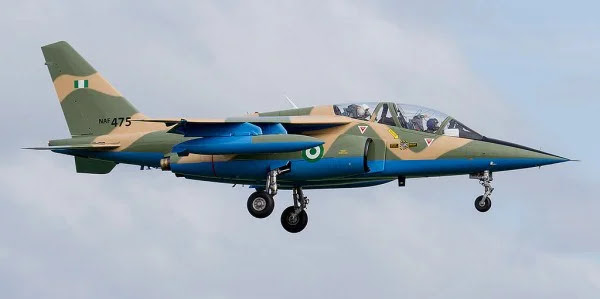In a decisive and well-coordinated military operation, the Nigerian Air Force (NAF), in synergy with ground troops, neutralized over 30 terrorists in Borno State, a region long plagued by insurgent activities. The operation, which unfolded in the volatile northeastern part of Nigeria, underscores the military’s renewed commitment to rooting out terrorism and restoring peace to communities ravaged by years of conflict. This successful mission is a testament to the growing operational capabilities of the Nigerian armed forces, as well as their determination to dismantle terrorist networks that have terrorized the region for over a decade.
Background: The Insurgency in Borno State
Borno State, located in Nigeria’s northeast, has been the epicenter of the Boko Haram insurgency since 2009. The terrorist group, whose name loosely translates to “Western education is forbidden,” has waged a brutal campaign aimed at establishing an Islamic caliphate in the region. Over the years, Boko Haram and its splinter faction, the Islamic State West Africa Province (ISWAP), have carried out devastating attacks, including suicide bombings, abductions, and raids on civilian and military targets. The conflict has resulted in the deaths of tens of thousands of people, displaced millions, and caused widespread destruction of infrastructure.
The Nigerian military, supported by regional and international partners, has been engaged in a protracted counterinsurgency campaign to degrade the capabilities of these terrorist groups. Despite significant progress, including the liberation of territories once controlled by Boko Haram, the insurgents continue to pose a threat, particularly in remote and ungoverned areas of Borno State. The Sambisa Forest, Lake Chad region, and other parts of the state have served as hideouts for terrorists, who use these areas to launch attacks and evade capture.
In recent years, the Nigerian government has intensified efforts to combat terrorism through a combination of military operations, intelligence-driven strategies, and community engagement. The operation in question, which resulted in the neutralization of over 30 terrorists, is part of a broader effort to disrupt the operational capacity of insurgents and secure the region for civilians.
Details of the Operation
The operation took place in Borno State, though specific details regarding the exact location and timing were not disclosed in the original report, likely for security reasons. According to military sources, the operation was a joint effort involving air and ground components of the Nigerian armed forces. The Nigerian Air Force played a pivotal role, providing air support that complemented the efforts of ground troops in engaging the terrorists.
Intelligence reports had indicated the presence of a significant number of terrorists in a specific area of Borno State. The insurgents were reportedly planning attacks on civilian and military targets, prompting the military to act swiftly to neutralize the threat. The operation was carefully planned, with reconnaissance missions conducted to gather actionable intelligence on the terrorists’ movements, hideouts, and operational tactics.
The Nigerian Air Force deployed fighter jets and attack helicopters to provide aerial cover and precision strikes. These air assets were critical in softening the terrorists’ defenses, disrupting their formations, and preventing them from escaping. The air strikes targeted key terrorist positions, including hideouts and supply routes, effectively weakening their operational capacity.
On the ground, Nigerian Army troops, supported by other security agencies, moved in to engage the terrorists in close combat. The ground forces demonstrated remarkable bravery and tactical proficiency, overpowering the insurgents in a fierce firefight. The combined air and ground assault overwhelmed the terrorists, resulting in the neutralization of over 30 of them. The operation also led to the recovery of weapons, ammunition, and other materials used by the insurgents.
Strategic Importance of the Operation
The successful neutralization of over 30 terrorists in Borno State is a significant milestone in Nigeria’s counterinsurgency efforts. The operation demonstrates the effectiveness of joint military operations, where air and ground forces work in tandem to achieve a common objective. By leveraging air superiority and ground maneuverability, the Nigerian military was able to deliver a decisive blow to the terrorists, disrupting their plans and weakening their operational capabilities.
The operation also highlights the importance of intelligence in modern warfare. The ability to gather accurate and timely intelligence on terrorist movements and activities is critical to the success of military operations. In this case, the military’s use of reconnaissance and surveillance assets enabled them to pinpoint the terrorists’ location and execute a targeted strike. This intelligence-driven approach has become a cornerstone of Nigeria’s counterinsurgency strategy, as it allows the military to stay one step ahead of the insurgents.
Furthermore, the operation sends a strong message to terrorist groups operating in the region. The Nigerian military’s ability to conduct large-scale, coordinated operations demonstrates its resolve to eliminate terrorism and restore peace to affected communities. The neutralization of over 30 terrorists not only reduces the immediate threat posed by these individuals but also serves as a deterrent to other insurgents who may be planning attacks.
The Role of the Nigerian Air Force
The Nigerian Air Force has emerged as a critical component of Nigeria’s counterinsurgency campaign. Over the years, the NAF has significantly enhanced its capabilities through the acquisition of modern aircraft, advanced weaponry, and improved training programs. These investments have enabled the NAF to provide effective air support to ground operations, conduct precision strikes, and carry out reconnaissance missions in support of the broader counterinsurgency effort.
In this particular operation, the NAF’s air assets played a crucial role in ensuring the success of the mission. Fighter jets and attack helicopters were used to deliver precise and devastating strikes on terrorist positions, creating an environment where ground troops could advance with minimal resistance. The NAF’s ability to deploy air assets quickly and effectively underscores the importance of air power in modern counterinsurgency operations.
The NAF has also been proactive in developing its human capital. Pilots, technicians, and support personnel undergo rigorous training to ensure they are well-equipped to handle the demands of modern warfare. This focus on capacity building has paid dividends, as evidenced by the success of operations like the one in Borno State.
Challenges in the Fight Against Terrorism
While the neutralization of over 30 terrorists is a significant achievement, the fight against terrorism in Nigeria remains a complex and multifaceted challenge. Boko Haram and ISWAP have proven to be resilient adversaries, capable of adapting their tactics and exploiting vulnerabilities in the region. The insurgents often operate in remote areas, making it difficult for security forces to track and engage them. Additionally, the porous nature of Nigeria’s borders with neighboring countries like Chad, Cameroon, and Niger has allowed terrorists to move freely and access resources.
Socioeconomic factors also contribute to the persistence of the insurgency. Poverty, unemployment, and lack of access to education and healthcare have created fertile ground for terrorist recruitment, particularly among vulnerable youth. Addressing these underlying issues is critical to achieving lasting peace in the region.
The humanitarian crisis in Borno State further complicates the situation. Millions of people have been displaced by the conflict, and many live in overcrowded camps with limited access to food, water, and medical care. The Nigerian government, in collaboration with international organizations, has made efforts to address the humanitarian needs of affected populations, but significant challenges remain.
Broader Implications for Nigeria’s Security
The success of this operation has broader implications for Nigeria’s security landscape. By neutralizing a significant number of terrorists, the military has disrupted the operational capacity of insurgent groups in Borno State, potentially reducing the frequency and intensity of attacks in the region. This creates an opportunity for the government to consolidate its gains, strengthen security infrastructure, and rebuild communities affected by the conflict.
The operation also highlights the importance of inter-agency collaboration in addressing security challenges. The synergy between the Nigerian Air Force and ground troops was a key factor in the success of the mission. This level of coordination must be sustained and expanded to ensure that the military can respond effectively to emerging threats.
At the regional level, Nigeria’s counterinsurgency efforts have implications for the broader Lake Chad Basin region, where Boko Haram and ISWAP operate across multiple countries. The Multinational Joint Task Force (MJTF), which includes troops from Nigeria, Chad, Cameroon, and Niger, has been instrumental in coordinating regional efforts to combat terrorism. The success of operations like the one in Borno State strengthens the MJTF’s ability to degrade terrorist networks and secure the region.
Community Impact and the Path to Peace
The neutralization of over 30 terrorists is likely to have a positive impact on communities in Borno State. For years, residents of the region have lived in fear of attacks, abductions, and other forms of violence. The success of this operation provides a glimmer of hope that peace and stability can be restored, allowing communities to rebuild and thrive.
However, achieving lasting peace requires more than military victories. The Nigerian government must invest in reconstruction and development efforts to address the root causes of the insurgency. This includes rebuilding schools, hospitals, and other critical infrastructure, as well as creating economic opportunities for residents. Community engagement and reconciliation programs are also essential to fostering trust between the government and local populations.
The military must also prioritize the protection of civilians during operations. While the neutralization of terrorists is a critical objective, ensuring the safety of innocent people caught in the crossfire is equally important. The Nigerian armed forces have made strides in this area, but ongoing efforts are needed to minimize collateral damage and uphold human rights standards.
International Support and Collaboration
Nigeria’s fight against terrorism has received significant support from international partners, including the United States, United Kingdom, and France. These countries have provided military training, equipment, and intelligence support to enhance the capabilities of the Nigerian armed forces. Regional organizations, such as the African Union and the Economic Community of West African States (ECOWAS), have also played a role in supporting Nigeria’s counterinsurgency efforts.
The success of the operation in Borno State is likely to bolster confidence among Nigeria’s international partners, who have long advocated for a comprehensive approach to combating terrorism. Continued collaboration with these partners will be essential to sustaining the momentum generated by this operation and achieving long-term security objectives.
Conclusion
The Nigerian Air Force, in collaboration with ground troops, has delivered a significant blow to terrorist groups in Borno State by neutralizing over 30 insurgents in a well-coordinated operation. This success highlights the importance of joint military operations, intelligence-driven strategies, and the effective use of air power in counterinsurgency efforts. While the operation marks a milestone in Nigeria’s fight against terrorism, it also underscores the need for a comprehensive approach that addresses the root causes of the insurgency, including poverty, unemployment, and lack of access to education.
As Nigeria continues its efforts to combat terrorism, the government must prioritize reconstruction, community engagement, and regional collaboration to achieve lasting peace. The success of this operation serves as a reminder of the resilience and determination of the Nigerian armed forces, as well as the hope for a brighter future for the people of Borno State and beyond.







